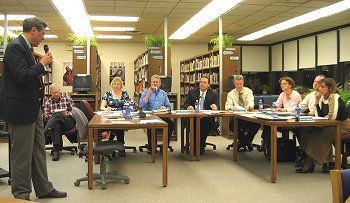- By Dan Veaner
- News
 Print
Print 
David Klemm
"We all know that education is labor intensive," Klemm explained. "That's where most of our monies are. If you look at the expenses in the rollover budget, I expect about $11.7 million of expenditures in salaries for next year, whereas the budget amount for last year was $10.8 million. I estimate salaries are going to increase about 7.69%."
Klemm presented the rollover budget as a first step in determining what will be in and what will be out of next year's budget. He said that 71% of the budget is contractual, with raises in salaries and service payments built in. The budget will have to make up a $262,000 shortfall from this year, and Klemm says he is concerned about the reliability of state funding and interest on investments because of uncertainties in the stock market and the state of the economy. Ironically the stock market tanked the next day, falling 370 points on Tuesday.
He suggested that part of the problems the district has faced with spending this year were caused by unrealistic budgeting last year. "If you look at the bottom line the expenditures from last year were $22,080,000," Klemm explained. "The budget for this year was $22,094,000, a difference of only $14,000. To a certain degree that is an area where we have some concern. That somewhat led to the $262,000 deficit in this year's budget."
Board member Bonita Lindberg blamed bad budgeting last year, but Keane disagreed. "I think it was bad execution of the budget," he said. "We had a budget of $22,094,000 and had assurances that the district could run on that. But I don't think the next step was taken to execute those adjustments in the budget."
"The marching orders were clearly out of sync with where they needed to be," Lindberg agreed.
Klemm said that contractual or fixed expenses account for 93% of the budget. Supplies and materials, miscellaneous expenses, conferences, and so on make up the other 7%. "So if you're going to make a difference in your budget it's very, very important that you look at your contractual expenses," Klemm said. "You just have to, because these other types of expenses are such a minimal part of the budget."
Klemm warned of concerns on the revenue side of the budget as well. He said that in addition to a volatile stock market, fluctuations in the housing market and interest rates may also have a negative impact on school revenues. "When it comes to the greater part of your miscellaneous revenues, which are from interest earned, I project that rate is going to go from about 4.25% down to maybe 2.25%," he warned. "I think we're going to lose about two percentage points on interest earnings. So our interest earnings are going to go from over $400,000 down to around $200,000."
He also outlined concerns with Governor Spitzer's proposal for state aid and school funding, warning that funds that Lansing may receive this year could lead to unfunded obligations in future years.
"We have to focus on what the voters approve," said board President Tom Keane. "That's the expenditure side of the budget, the appropriations side. That's mainly our task to control that side of the house, and do the best we can with our revenues."
Focusing on one side of the budget without close attention to the other can be fraught with peril, as the board found out last year. Despite a 3.8% rise in the budget, actual taxes went up almost 10%. That was unacceptable for some board members. When Klemm asked how much of a budget rise would be acceptable to the board Keane asked for three versions, showing cuts necessary for a 7% rise as well as 5% and 3%. Anne Drake stated that a 7% rise is too high. And while others agreed, they wanted to see what impact a 7% higher budget would have on the district.
"I'd like to see you knock $1,235,475 out of there," Dittman said. "That's everything over a 3% increase from last year's budget."
"To put things in perspective, for every percent that you decrease the budget you're talking about $220,000," Klemm said. "If you're going down to 5% you're talking about $750,000 worth of cuts."
 (Left to right) David Klemm, School Board members David Dittman, Anne Drake, Tom Keane, Superintendent Steve Grimm, Mike Cheatham, Sandi Dhimitri, Glenn Sawnson, Bonita Lindberg |
Superintendent Stephen Grimm said he prefers to look at a 7% and 5% budget first to illustrate the impact those rises would have on the district, at least until focus groups could begin working on needs and cuts. "We will get to the 3% eventually as we move forward," he said. "It's moving in gradually versus shock and put things back in. We don't want to scare everybody. We've got plenty of time to go 7, 5, 3. For the first draft I'd like to get at least to the 5 and then have serious talks."
The rollover budget includes a Director of Instruction and a secretary, positions that were to be hired this year but were put on hold in the wake of projected overruns. Those positions account for $107,000, not counting benefits. While it looks unlikely that those positions will be added next year, both Klemm and Grimm seemed to be trying to prepare the board for cuts in teaching and support staff positions as well.
"Hot topics will emerge," Grimm said. "Well we've got to go there. We've got to go to class size. We've got to go to high school electives. We've got to go to elementary science program, things like that. But while we're addressing these hot topics we're going to improve the conversation with the stakeholders involved and they'll know what to expect. That information will be collected and organized in a way that you'll be able to intelligently make good decisions about what our priorities are."
While the 'rollover' budget figures are only an early stage of the budgeting process, they illustrated the challenge the board will have in developing their budget for next year. The BOE will be forced to make unpopular decisions to balance program needs with taxes that have been spiralling out of control. "As long as when we get to the end we know what it means for a 3% budget," board member Glenn Swanson said. "I think a lot of people in the community would expect that we should be able to run the schools (on a budget) based on inflation."
----
v4i6



